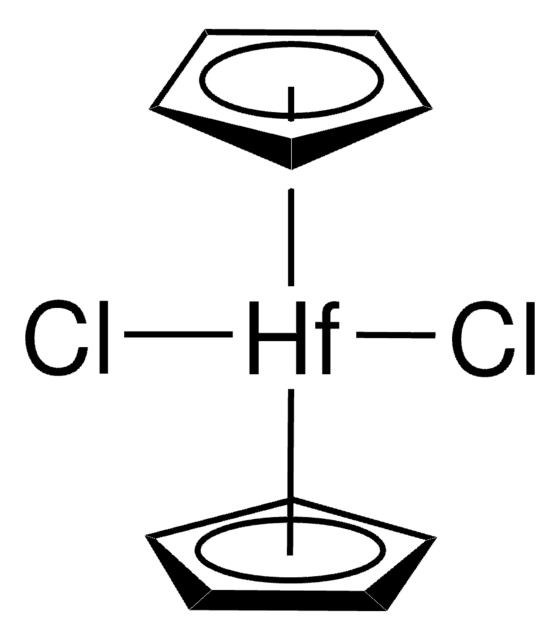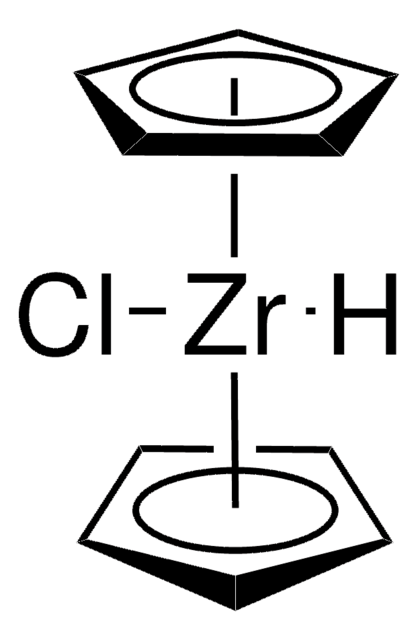196215
Bis(cyclopentadienyl)zirconium(IV) dichloride
≥98%
Sinónimos:
Dichlorodicyclopentadienylzirconium, Dichlorozirconocene, Zirconium dicyclopentadiene dichloride, Di(cyclopentadienyl)zirconium(IV) dichloride, Zirconocene dichloride
About This Item
Productos recomendados
assay
≥98%
form
solid
reaction suitability
core: zirconium
reaction type: Polymerization Reactions
reagent type: catalyst
reaction type: Olefin Metathesis
greener alternative product characteristics
Catalysis
Learn more about the Principles of Green Chemistry.
sustainability
Greener Alternative Product
parameter
moisture sensitive
mp
242-245 °C (lit.)
greener alternative category
, Aligned
storage temp.
2-8°C
SMILES string
Cl[Zr]Cl.[CH]1[CH][CH][CH][CH]1.[CH]2[CH][CH][CH][CH]2
InChI
1S/2C5H5.2ClH.Zr/c2*1-2-4-5-3-1;;;/h2*1-5H;2*1H;/q;;;;+2/p-2
InChI key
QRUYYSPCOGSZGQ-UHFFFAOYSA-L
¿Está buscando productos similares? Visita Guía de comparación de productos
General description
Zirconocene dichloride serves as a catalyst, enabling efficient synthesis of pyrrole with high yields and simplifies the purification process economically.
Application
Direct amide formation from unactivated carboxylic acids and amines
signalword
Warning
hcodes
Hazard Classifications
Eye Irrit. 2 - Skin Irrit. 2 - STOT SE 3
target_organs
Respiratory system
Storage Class
11 - Combustible Solids
wgk_germany
WGK 3
flash_point_f
Not applicable
flash_point_c
Not applicable
ppe
dust mask type N95 (US), Eyeshields, Gloves
Certificados de análisis (COA)
Busque Certificados de análisis (COA) introduciendo el número de lote del producto. Los números de lote se encuentran en la etiqueta del producto después de las palabras «Lot» o «Batch»
¿Ya tiene este producto?
Encuentre la documentación para los productos que ha comprado recientemente en la Biblioteca de documentos.
Nuestro equipo de científicos tiene experiencia en todas las áreas de investigación: Ciencias de la vida, Ciencia de los materiales, Síntesis química, Cromatografía, Analítica y muchas otras.
Póngase en contacto con el Servicio técnico




![Dichloro[rac-ethylenebis(4,5,6,7-tetrahydro-1-indenyl)]zirconium(IV) 97%](/deepweb/assets/sigmaaldrich/product/structures/571/886/f2860a8d-a40a-461c-ba1e-93913a644d32/640/f2860a8d-a40a-461c-ba1e-93913a644d32.png)

![Dichloro[rac-ethylenebis(indenyl)]zirconium(IV)](/deepweb/assets/sigmaaldrich/product/structures/296/699/b249f923-58d9-45b3-bd63-b110942453d3/640/b249f923-58d9-45b3-bd63-b110942453d3.png)


